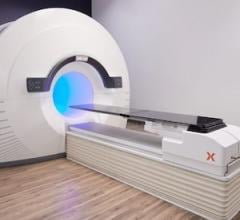
Howard Sandler, MD, FASTRO, Radiation Oncology Department Chair at Cedars-Sinai Medical Center (Los Angeles, CA), will take the helm as President of the American Society for Radiation Oncology during ASTRO 2023, to be held October 1-4 in San Diego, CA. Phot courtesy: Cedars-Sina Medical Center
September 26, 2023 — Ahead of the 65th American Society for Radiation Oncology Annual Meeting, ASTRO 2023, ITN’s Managing Editor interviewed ASTRO President-Elect Howard Sandler, MD, FASTRO. The Ronald H. Bloom Professor and Chair of Radiation Oncology at Cedars-Sinai Medical Center in Los Angeles, CA, Sandler is a nationally recognized expert in genitourinary cancers, with more than a decade of experience as Chair of the RTOG/NRG Oncology committee that designed and oversaw prostate cancer clinical trials.
Sandler will take the helm as President (2023-2024) at the upcoming the meeting to be held October 1-4 at the San Diego Convention Center in San Diego, CA. In the role of President-Elect for the past year, he was instrumental in planning ASTRO 2023: “Pay It Forward: Partnering with Our Patients.”
As noted in a Cedars-Sinai statement announcing his election, Sandler also has an extensive record of service with both ASTRO and the oncology field. He served on the Board of Directors as chair of ASTRO’s Government Relations Council and is a long-term member of ASTRO’s Prostate/GU Resource Panel. He has been instrumental in leading the development of clinical guidelines and multidisciplinary scientific meetings focused on prostate cancer, and he recently served as faculty advisor to the Association of Residents in Radiation Oncology.
An excerpt of the deep-dive discussion held prior to the annual meeting is shared here. Stay engaged with ITN during and after the Annual Meeting for ASTRO 2023 news coverage from San Diego, and be sure to read the full feature with additional insights from Sandler — on meeting highlights, advice for early career radiation oncologists, and on what’s most exciting on the horizon — in the Imaging Technology News/ITN November/December online and print issue.
ITN: What’s most important to know about advances in radiation oncology today?
Sander: I would say that that radiation oncology has been striving to make treatments much more patient-centered and personalized. And if I had to say what was one of the most progressive themes in radiation oncology over the last, you know, 20 years or so, is that we've turned our treatments from an often one size fits all management strategy to highly individualized treatment. The way we've been doing that is by using improvements in imaging, such as MRI guidance, and PET imaging, to identify with more specificity and more clarity, what tissues need. To receive therapeutic doses of radiation. And in that way, what we've been able to do is personalize the treatment, give more radiation where it's needed, to have less radiation where it's not needed, and the net benefit of that is, is better cancer control and less morbidity from radiation. That is, I think, a thematic advance in our field is more personalized treatment.
There is also better diagnostic imaging — better PET scans, better MRI. But separate from that we use imaging during radiation to deliver what's called image-guided radiotherapy. And that's not diagnostic imaging, but it's imaging that takes place in the context and during an actual radiation treatment. And that can be done with either X-rays or MRI. This intra-treatment-imaging allows for more precision with radiation because we're aiming radiation inside an individual typically at their prostate gland, for example. But if we can image the prostate prior to treatment, and then make micro adjustments in localizing where the radiation goes, we can reduce our safety margin for delivering treatment. So, image guided treatment is an important advance.
As I mentioned, the net result of this is better outcome and less morbidity. Our big goal and the goal I strive for when I treat a patient, and see them in follow up after treatment, is normality. We want people after treatment to have their lives as close to their pre- cancer diagnosis state as possible, so that they go around and work or do their retirement activities, and that days or weeks go by where they don't even think about cancer treatment. That's what we strive for. And I think we're getting better and better in time.
ITN: Can you speak to the progress on health equity ASTRO is making?
Sandler: I'm happy to address that, and to say that ASTRO and our field are highly engaged in having the future of radiation oncology be an accurate reflection of the patients that we care for. We think there's value in a diverse workforce. And one thing we've done in a very concrete way is to create a new council within ASTRO for Health Equity, Diversity and Inclusion. We call it HEDI. The leaders of that council are ASTRO board members, and that's relatively new but from my own onboard my board experience, the contributions of a council that focused on issues related to Equity Diversity and Inclusion. This has been very helpful and we've come a long way.
We'll continue to focus on issues within the specialty because I think we recognize we have more to do. Separate from that, we're also interested in diversity in clinical trials. We want our research subjects to also be a reflection of the community that we treat, so that the results of our trials are generalizable to the community at large. If you only do, for example, studies on male patients, you can't automatically assume that the results will equally apply to other populations of patients. So one has to make sure that the patient population in clinical trials is an accurate reflection of the patient population at large.
One of the major themes of this year's 2023 annual meeting is, in fact, clinical trials. Our current president, Jeff Michalski, MD, MBA, FASTRO, has been a clinical trialist his whole life. This year, we’ve included issues addressing that priority, and focused on issues related to diverse clinical trial participation.
ITN: Top priorities during your term as ASTRO President?
Sandler: I'll cover three top priorities. One is, as mentioned, improving diversity and clinical trial accrual. Radiation oncologists are highly research clinical trial focused, and we believe ourselves to be a highly data driven specialty. Our trainees and young graduates can quote chapter and verse from relevant clinical trials to help justify the treatments they do and to improve our treatments for the next generation. We're going to have to continue to do clinical trials to answer important questions and lead to the better treatments of tomorrow.
A second priority would be working with Congress to modify the way radiation oncologists are reimbursed for their work. There’s been a movement towards value- based payments so that we, as physicians, are not paid strictly fee for service, but paid more for doing the right thing. Working with our congressional partners, we're developing a new strategy that we call ROCR, the radiation oncology case rate. So that, for example, a radiation oncologist would get a fixed fee that's consistent with what we're getting today. And at that time, he/she can deliver a treatment with one, five,10 or 20 treatments — whatever we think is best for that individual, so that the treatment plan can be optimized for the patient without any consideration about whether the treatment could be modified to enhance the reimbursement. This is a big shift for us to move towards value-based care, and we're working with congressional champions try to make that happen.
And then finally, I'm interested in making sure that radiation oncologists, to the extent that we can, are more balanced. There's a science of happiness, of what makes individuals happy. It's my view that radiation oncologists who are well balanced and happy provide better care for cancer patients, so that's also a priority of mine.
For more information: www.astro.org
Follow ITN’s ASTRO news coverage here
Related content:
Dr. Sameer Keole voted President-elect of the American Society for Radiation Oncology (ASTRO)


 February 04, 2026
February 04, 2026 









